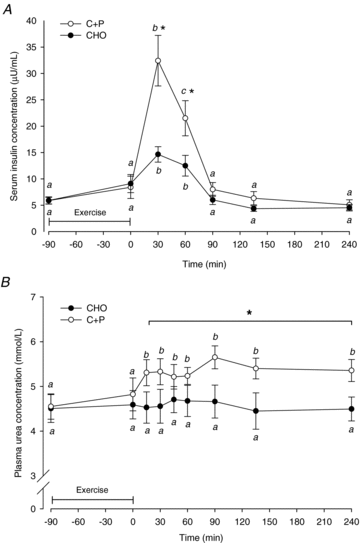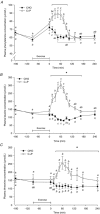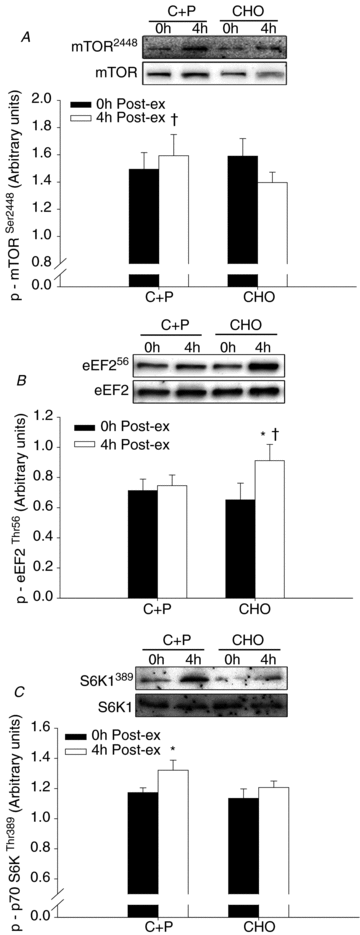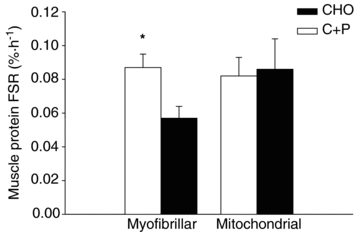The influence of carbohydrate-protein co-ingestion following endurance exercise on myofibrillar and mitochondrial protein synthesis - PubMed (original) (raw)
Randomized Controlled Trial
. 2011 Aug 15;589(Pt 16):4011-25.
doi: 10.1113/jphysiol.2011.211888. Epub 2011 Jul 11.
Affiliations
- PMID: 21746787
- PMCID: PMC3179999
- DOI: 10.1113/jphysiol.2011.211888
Randomized Controlled Trial
The influence of carbohydrate-protein co-ingestion following endurance exercise on myofibrillar and mitochondrial protein synthesis
Leigh Breen et al. J Physiol. 2011.
Abstract
The aim of the present study was to determine mitochondrial and myofibrillar muscle protein synthesis (MPS) when carbohydrate (CHO) or carbohydrate plus protein (C+P) beverages were ingested following prolonged cycling exercise. The intracellular mechanisms thought to regulate MPS were also investigated. In a single-blind, cross-over study, 10 trained cyclists (age 29 ± 6 years, VO2max 66.5 ± 5.1 ml kg(−1) min(−1)) completed two trials in a randomized order. Subjects cycled for 90 min at 77 ± 1% VO2max before ingesting a CHO (25 g of carbohydrate) or C+P (25 g carbohydrate + 10 g whey protein) beverage immediately and 30 min post-exercise. A primed constant infusion of L-[ring-(13)C6]phenylalanine began 1.5 h prior to exercise and continued until 4 h post-exercise. Muscle biopsy samples were obtained to determine myofibrillar and mitochondrial MPS and the phosphorylation of intracellular signalling proteins. Arterialized blood samples were obtained throughout the protocol. Plasma amino acid and urea concentrations increased following ingestion of C+P only. Serum insulin concentration increased more for C+P than CHO. Myofibrillar MPS was ∼35% greater for C+P compared with CHO (0.087 ± 0.007 and 0.057 ± 0.006% h(−1), respectively; P = 0.025). Mitochondrial MPS rates were similar for C+P and CHO (0.082 ± 0.011 and 0.086 ± 0.018% h(−1), respectively). mTOR(Ser2448) phosphorylation was greater for C+P compared with CHO at 4 h post-exercise (P < 0.05). p70S6K(Thr389) phosphorylation increased at 4 h post-exercise for C+P (P < 0.05), whilst eEF2(Thr56) phosphorylation increased by ∼40% at 4 h post-exercise for CHO only (P < 0.01). The present study demonstrates that the ingestion of protein in addition to carbohydrate stimulates an increase in myofibrillar, but not mitochondrial, MPS following prolonged cycling. These data indicate that the increase in myofibrillar MPS for C+P could, potentially, be mediated through p70S6K, downstream of mTOR, which in turn may suppress the rise in eEF2 on translation elongation.
Figures
Figure 1
Schematic diagram of the experimental protocol
Figure 2. Serum insulin (A) and plasma urea (B) concentrations in CHO and C+P trials
Means within each trial with different subscripts are significantly different from each other (P < 0.05). *Significant difference between CHO and C+P at each respective time point. Values are means ± SEM; n = 10.
Figure 3. Plasma concentrations of phenylalanine (A), leucine (B) and threonine (C)
Means within each trial with different subscripts are significantly different from each other (P < 0.05). *Significant difference between CHO and C+P (P < 0.05). Values are means ± SEM; n = 10.
Figure 4. Enrichment of 13C6 phenylalanine in plasma
%t/T: percentage of tracer-to-tracee ratio. Values are means ± SEM; n = 10.
Figure 5. Post-exercise protein phosphorylation of mTORSer2448 (A), eEF2Thr56 (B) and p70S6KThr389 (C)
*Significant time effect for protein phosphorylation at 4h compared with 0h post-exercise (P < 0.05). †Significant group effect for protein phosphorylation at 4h post-exercise between CHO and C+P (P < 0.05). Values are means ± SEM; n = 8.
Figure 6. Myofibrillar (n = 10) and mitochondrial (n = 8) fractional synthetic rate
*Significant difference between CHO and C+P (P < 0.05). Values are means ± SEM.
Comment in
- Protein ingestion after endurance exercise: the 'evolving' needs of the mitochondria?
Moore DR, Stellingwerff T. Moore DR, et al. J Physiol. 2012 Apr 15;590(8):1785-6. doi: 10.1113/jphysiol.2011.224188. J Physiol. 2012. PMID: 22532648 Free PMC article. No abstract available.
Similar articles
- Protein-leucine fed dose effects on muscle protein synthesis after endurance exercise.
Rowlands DS, Nelson AR, Phillips SM, Faulkner JA, Clarke J, Burd NA, Moore D, Stellingwerff T. Rowlands DS, et al. Med Sci Sports Exerc. 2015 Mar;47(3):547-55. doi: 10.1249/MSS.0000000000000447. Med Sci Sports Exerc. 2015. PMID: 25026454 Clinical Trial. - Myofibrillar and Mitochondrial Protein Synthesis Rates Do Not Differ in Young Men Following the Ingestion of Carbohydrate with Milk Protein, Whey, or Micellar Casein after Concurrent Resistance- and Endurance-Type Exercise.
Churchward-Venne TA, Pinckaers PJM, Smeets JSJ, Peeters WM, Zorenc AH, Schierbeek H, Rollo I, Verdijk LB, van Loon LJC. Churchward-Venne TA, et al. J Nutr. 2019 Feb 1;149(2):198-209. doi: 10.1093/jn/nxy244. J Nutr. 2019. PMID: 30698725 Free PMC article. Clinical Trial. - Alcohol ingestion impairs maximal post-exercise rates of myofibrillar protein synthesis following a single bout of concurrent training.
Parr EB, Camera DM, Areta JL, Burke LM, Phillips SM, Hawley JA, Coffey VG. Parr EB, et al. PLoS One. 2014 Feb 12;9(2):e88384. doi: 10.1371/journal.pone.0088384. eCollection 2014. PLoS One. 2014. PMID: 24533082 Free PMC article. Clinical Trial. - International society of sports nutrition position stand: nutrient timing.
Kerksick CM, Arent S, Schoenfeld BJ, Stout JR, Campbell B, Wilborn CD, Taylor L, Kalman D, Smith-Ryan AE, Kreider RB, Willoughby D, Arciero PJ, VanDusseldorp TA, Ormsbee MJ, Wildman R, Greenwood M, Ziegenfuss TN, Aragon AA, Antonio J. Kerksick CM, et al. J Int Soc Sports Nutr. 2017 Aug 29;14:33. doi: 10.1186/s12970-017-0189-4. eCollection 2017. J Int Soc Sports Nutr. 2017. PMID: 28919842 Free PMC article. Review. - Protein turnover, amino acid requirements and recommendations for athletes and active populations.
Poortmans JR, Carpentier A, Pereira-Lancha LO, Lancha A Jr. Poortmans JR, et al. Braz J Med Biol Res. 2012 Oct;45(10):875-90. doi: 10.1590/s0100-879x2012007500096. Epub 2012 Jun 6. Braz J Med Biol Res. 2012. PMID: 22666780 Free PMC article. Review.
Cited by
- Translocation and protein complex co-localization of mTOR is associated with postprandial myofibrillar protein synthesis at rest and after endurance exercise.
Abou Sawan S, van Vliet S, Parel JT, Beals JW, Mazzulla M, West DWD, Philp A, Li Z, Paluska SA, Burd NA, Moore DR. Abou Sawan S, et al. Physiol Rep. 2018 Mar;6(5):e13628. doi: 10.14814/phy2.13628. Physiol Rep. 2018. PMID: 29512299 Free PMC article. - Assessing Overall Exercise Recovery Processes Using Carbohydrate and Carbohydrate-Protein Containing Recovery Beverages.
Russo I, Della Gatta PA, Garnham A, Porter J, Burke LM, Costa RJS. Russo I, et al. Front Physiol. 2021 Feb 4;12:628863. doi: 10.3389/fphys.2021.628863. eCollection 2021. Front Physiol. 2021. PMID: 33613323 Free PMC article. - Effects of Protein Supplementation on Performance and Recovery in Resistance and Endurance Training.
Cintineo HP, Arent MA, Antonio J, Arent SM. Cintineo HP, et al. Front Nutr. 2018 Sep 11;5:83. doi: 10.3389/fnut.2018.00083. eCollection 2018. Front Nutr. 2018. PMID: 30255023 Free PMC article. Review. - Role of Functional Beverages on Sport Performance and Recovery.
Orrù S, Imperlini E, Nigro E, Alfieri A, Cevenini A, Polito R, Daniele A, Buono P, Mancini A. Orrù S, et al. Nutrients. 2018 Oct 10;10(10):1470. doi: 10.3390/nu10101470. Nutrients. 2018. PMID: 30308976 Free PMC article. Review. - Optimizing intramuscular adaptations to aerobic exercise: effects of carbohydrate restriction and protein supplementation on mitochondrial biogenesis.
Margolis LM, Pasiakos SM. Margolis LM, et al. Adv Nutr. 2013 Nov 6;4(6):657-64. doi: 10.3945/an.113.004572. eCollection 2013 Nov. Adv Nutr. 2013. PMID: 24228194 Free PMC article. Review.
References
- Abumarad N, Rabin ND, Diamond MP. Use of a heated superficial hand vein as an alternative site for the measurement of amino acid concentrations and for the study of glucose and alanine kinetics in man. Metabolism. 1981;30:936–941. - PubMed
- Atherton PJ, Etheridge T, Watt PW, Wilkinson D, Selby A, Rankin D, Smith K, Rennie MJ. Muscle full effect after oral protein: time-dependent concordance and discordance between human muscle protein synthesis and mTORC1 signaling. Am J Clin Nutr. 2010;92:1080–1088. - PubMed
- Baumann PQ, Stirewalt WS, O'Rourke BD, Howard D, Nair KS. Precursor pools of protein synthesis: a stable isotope study in a swine model. Am J Physiol Endocrinol Metab. 1994;267:E203–E209. - PubMed
- Beelen M, Tieland M, Gijsen AP, Vandereyt H, Kies AK, Kuipers H, Saris WH, Koopman R, van Loon LJ. Coingestion of carbohydrate and protein hydrolysate stimulates muscle protein synthesis during exercise in young men, with no further increase during subsequent overnight recovery. J Nutr. 2008;138:2198–2204. - PubMed
Publication types
MeSH terms
Substances
LinkOut - more resources
Full Text Sources
Other Literature Sources
Medical
Miscellaneous





